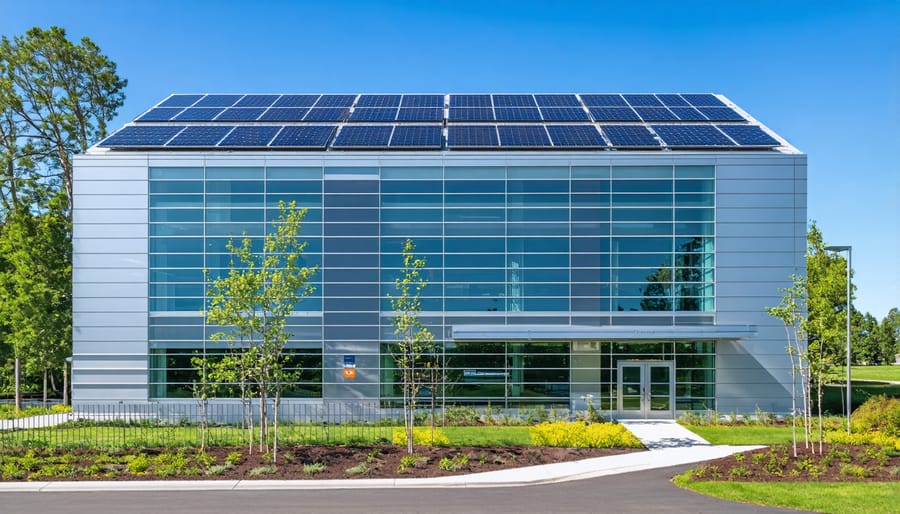In today’s energy-conscious landscape, Energy Efficiency Specialists are revolutionising how Australian businesses and homes consume power. These sustainability champions combine technical expertise with practical problem-solving to slash energy costs and reduce carbon footprints across the nation.
From conducting comprehensive energy audits in Sydney’s bustling commercial districts to implementing smart building systems in Melbourne’s residential developments, these professionals are at the forefront of Australia’s transition to a more sustainable future. Their impact is measurable and significant – typically delivering 20-40% energy savings for clients while helping organisations meet increasingly stringent environmental regulations.
As businesses face mounting pressure to achieve net-zero targets and households grapple with rising energy costs, Energy Efficiency Specialists have emerged as crucial advisors in our collective journey towards sustainability. Their unique blend of engineering knowledge, data analysis skills, and practical experience helps bridge the gap between environmental aspirations and real-world solutions.
Whether you’re considering this dynamic career path or seeking expertise to transform your organisation’s energy performance, understanding the role of these specialists has never been more relevant to Australia’s sustainable future.
The Modern Energy Efficiency Specialist Role

Core Responsibilities and Expertise
An Energy Efficiency Specialist plays a vital role in helping organisations implement sustainable workplace practices while reducing energy consumption and costs. Their core expertise lies in conducting detailed energy audits, analysing consumption patterns, and developing tailored solutions for businesses across Australia.
These specialists must possess a strong foundation in engineering principles, particularly in electrical and mechanical systems, combined with practical knowledge of renewable energy technologies and building management systems. They regularly assess lighting, HVAC systems, industrial equipment, and building envelopes to identify opportunities for improvement.
Key responsibilities include:
– Conducting comprehensive energy assessments
– Developing energy management strategies
– Recommending cost-effective upgrades
– Monitoring and reporting on energy performance
– Ensuring compliance with Australian energy efficiency standards
– Training staff on energy-conscious behaviours
– Calculating return on investment for proposed solutions
Success in this role requires excellent analytical skills, attention to detail, and the ability to communicate complex technical information clearly to diverse stakeholders. Energy Efficiency Specialists often collaborate with facility managers, business owners, and contractors to implement recommendations and achieve meaningful results.
They stay current with emerging technologies, government incentives, and industry best practices to provide the most effective solutions for their clients. Their expertise helps organisations navigate the path to energy efficiency while contributing to Australia’s sustainability goals.
Essential Qualifications and Skills
To thrive as an energy efficiency specialist in Australia, you’ll need a combination of formal qualifications and practical skills. A bachelor’s degree in engineering, environmental science, or building design serves as a foundational requirement, with many professionals holding degrees from recognised Australian universities.
Industry certifications are crucial, particularly those recognised by the Clean Energy Council (CEC). The Certified Energy Manager (CEM) credential, offered through the Energy Efficiency Council, is highly valued by employers. Additionally, obtaining NABERS and Green Star accreditation demonstrates expertise in Australia’s primary building sustainability rating systems.
Essential technical skills include proficiency in energy modelling software, building management systems, and data analysis tools. You should be comfortable conducting energy audits, interpreting building plans, and using monitoring equipment to measure energy consumption patterns.
Strong analytical and problem-solving abilities are vital, as is excellent communication skill to explain complex technical concepts to diverse stakeholders. Experience with Australian energy regulations and standards, including the National Construction Code and AS/NZS 3598, is essential.
Many successful specialists also possess project management qualifications and maintain membership with professional bodies like the Energy Efficiency Council or Australian Institute of Energy. Staying current with emerging technologies and sustainable building practices through ongoing professional development is crucial for long-term success in this dynamic field.
Real Impact in Australian Workplaces
Cost Savings and ROI
The financial benefits of working with an energy efficiency specialist are substantial, as demonstrated by numerous success stories across Australia. Take the case of Melbourne-based manufacturer Cooper & Sons, who invested $45,000 in energy-efficient upgrades recommended by their specialist. Within 18 months, they reduced their energy costs by 35%, resulting in annual savings of $68,000 and a rapid return on investment.
Small businesses aren’t left out of the equation. The Green Cafe in Brisbane implemented simple changes suggested by their energy specialist, including LED lighting upgrades and smart controls for their cooling systems. Their initial investment of $12,000 yielded monthly savings of $800, paying for itself in just over a year while significantly reducing their carbon footprint.
In the commercial sector, a Sydney office building’s energy efficiency overhaul showcases the long-term benefits. The building owners invested $280,000 in comprehensive upgrades, including HVAC optimisation and smart building management systems. The results were impressive: a 42% reduction in energy consumption, annual savings of $145,000, and a complete return on investment within two years.
Beyond immediate cost savings, businesses working with energy efficiency specialists often report additional financial benefits, including increased property values, improved equipment longevity, and eligibility for government incentives. The Clean Energy Finance Corporation estimates that Australian businesses implementing comprehensive energy efficiency measures typically achieve ROI periods of 1-5 years, with some quick-win solutions paying back in months rather than years.
Local councils are also reaping the benefits. The City of Perth’s street lighting upgrade project, guided by energy specialists, is saving ratepayers $800,000 annually while reducing maintenance costs by 40%.
Environmental Benefits
Energy efficiency specialists play a crucial role in creating measurable environmental benefits that extend far beyond cost savings. When businesses work with these professionals to make your business carbon neutral, the positive impact on our environment is substantial and quantifiable.
In Australia, organisations implementing energy efficiency measures typically reduce their carbon emissions by 20-40% in the first year alone. A single commercial building upgrade guided by an energy efficiency specialist can eliminate up to 200 tonnes of CO2 emissions annually – equivalent to taking 43 cars off the road.
These specialists help organisations achieve impressive environmental milestones through various interventions. For instance, a Melbourne-based manufacturing facility reduced its water consumption by 45% through process optimisation, while a Sydney office building cut its electricity usage by 35% through smart lighting systems and HVAC improvements.
The ripple effect of these improvements extends to broader environmental benefits, including:
– Reduced strain on natural resources
– Decreased air and water pollution
– Lower waste production through efficient resource use
– Enhanced biodiversity protection through reduced environmental impact
– Improved indoor air quality and reduced urban heat island effect
The cumulative impact of energy efficiency initiatives is particularly significant in Australia, where commercial buildings account for approximately 25% of our national carbon emissions. By implementing expert-recommended solutions, businesses not only contribute to national sustainability targets but also help create a more resilient environment for future generations.

Implementation Strategies
Assessment and Planning
An energy efficiency specialist begins each project with a comprehensive workplace assessment, examining every aspect of a facility’s energy usage. This crucial first step involves gathering detailed data about current energy consumption patterns, identifying areas of waste, and understanding the unique operational requirements of the business.
During the initial walk-through, specialists document lighting systems, HVAC equipment, machinery operating hours, and building insulation quality. They also review historical energy bills and conduct interviews with staff to understand behavioural patterns that might affect energy use. This holistic approach ensures no opportunity to reduce power consumption is overlooked.
Using advanced diagnostic tools like thermal imaging cameras and power quality analysers, specialists create a detailed energy profile of the facility. This data forms the foundation for developing a strategic energy management plan that typically includes both immediate improvements and long-term recommendations.
The planning phase involves prioritising initiatives based on potential energy savings, implementation costs, and return on investment. Specialists work closely with facility managers to create realistic timelines and ensure minimal disruption to daily operations. They also consider available government incentives and rebates specific to Australian businesses, making recommendations more financially attractive while supporting national sustainability goals.
Each plan is customised to the facility’s unique needs, taking into account factors like local climate conditions, operational hours, and future expansion plans.
Employee Engagement
Creating a workplace culture focused on energy efficiency requires more than just implementing technical solutions – it’s about fostering a shared commitment to sustainability among all employees. Successful energy efficiency specialists know that lasting change happens when the entire team is invested in the mission.
Start by helping to engage your green team and establish regular sustainability meetings where staff can share ideas and celebrate wins. Consider implementing friendly competitions between departments to reduce energy consumption, with rewards for the most innovative solutions.
Recognition programs can significantly boost participation. Highlight employees who consistently demonstrate energy-conscious behaviours, such as shutting down equipment properly or identifying energy waste. Share their stories in company newsletters or during team meetings to inspire others.
Make energy efficiency visible and accessible through clear signage, real-time energy monitoring displays, and regular updates on sustainability goals. Create opportunities for hands-on learning through workshops and demonstrations, helping employees understand how their daily actions impact energy consumption.
Remember to keep communication channels open and encourage feedback. When staff members feel their input is valued, they’re more likely to actively participate in energy-saving initiatives. This collaborative approach not only helps achieve energy efficiency targets but also builds a stronger, more environmentally conscious workplace community.

Monitoring and Optimization
The success of energy efficiency initiatives hinges on robust monitoring and continuous optimization. Energy efficiency specialists in Australia employ a systematic approach to track performance and identify opportunities for improvement. Using advanced monitoring systems, they collect real-time data on energy consumption patterns, equipment performance, and environmental conditions.
Regular assessments include reviewing utility bills, analyzing energy management system data, and conducting periodic audits. These specialists often implement smart meters and sensors throughout facilities to gather detailed insights into energy usage peaks and trends. This data helps create baseline measurements and track progress against established sustainability goals.
A key aspect of optimization involves fine-tuning existing systems based on collected data. For instance, adjusting HVAC schedules to match actual building occupancy patterns or modifying lighting controls to maximise natural daylight use. Many Australian businesses now use cloud-based monitoring platforms that provide instant alerts for unusual consumption patterns or equipment inefficiencies.
The optimization process is cyclical, with specialists regularly reviewing performance metrics and implementing improvements. They often work closely with facility managers to develop response protocols for energy-related issues and create preventive maintenance schedules. This proactive approach helps prevent energy waste and extends equipment life.
Success stories from Australian businesses show that effective monitoring and optimization can reduce energy costs by 20-30% while improving occupant comfort and productivity. Regular reporting and stakeholder updates ensure transparency and maintain momentum in energy efficiency programs.
Energy efficiency specialists are becoming increasingly vital in Australia’s journey toward a sustainable future. As our nation grapples with rising energy costs and ambitious climate targets, these professionals stand at the forefront of transformative change in how we use and manage energy resources.
The value these specialists bring extends far beyond simple cost savings. They serve as catalysts for innovation, helping businesses and households reduce their carbon footprint while maintaining or improving operational efficiency. Their expertise has become particularly crucial as Australia transitions toward renewable energy sources and implements stricter environmental regulations.
Looking ahead, the career outlook for energy efficiency specialists in Australia appears exceptionally promising. The growing emphasis on sustainable practices, coupled with government incentives and corporate sustainability goals, is creating unprecedented demand for their expertise. Industry projections suggest a surge in opportunities across various sectors, from construction and manufacturing to consulting and public services.
Moreover, technological advancements are expanding the scope of what energy efficiency specialists can achieve. The integration of smart systems, artificial intelligence, and data analytics is opening new frontiers in energy management, requiring these professionals to continuously evolve their skills and knowledge base.
For businesses and organisations, investing in energy efficiency expertise is increasingly becoming a strategic necessity rather than an optional extra. The return on investment is often substantial, with many projects delivering both immediate cost savings and long-term environmental benefits. This dual advantage makes the role of energy efficiency specialists particularly valuable in the Australian context, where energy costs and environmental concerns are key business considerations.
As Australia moves toward its renewable energy targets and sustainable development goals, energy efficiency specialists will play an essential role in shaping a more sustainable future. Their ability to bridge technical expertise with practical solutions makes them indispensable partners in Australia’s journey toward energy efficiency and environmental responsibility.
